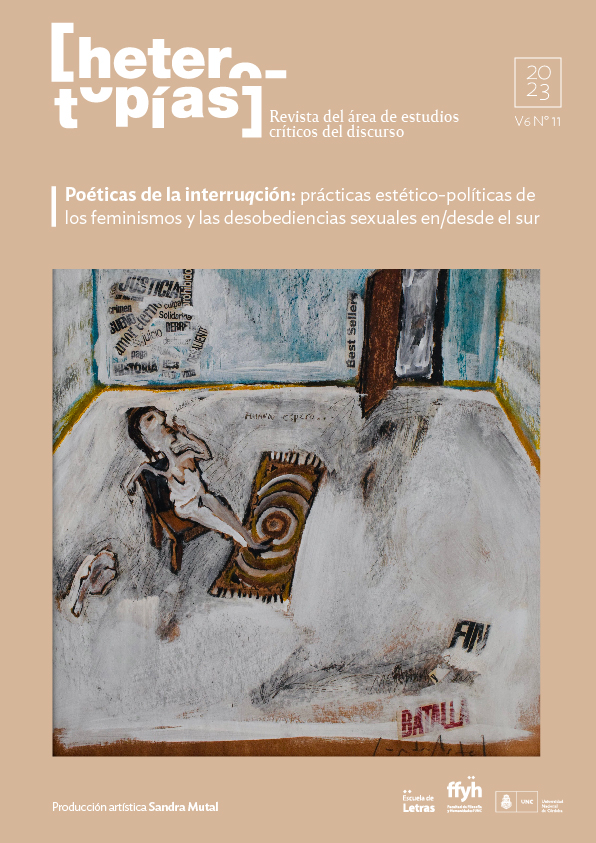Sound feminist narratives in a pandemic: activisms, journalistic practices and theoretical-critical interventions
Main Article Content
Abstract
In March 2020, the COVID-19 pandemic disrupted everyday life. In the heat of urgency, two themes emerged early in feminist narratives: violence and care tasks. In this work, however, we deal with another side derived from those days: listening to the sound feminist narratives that erupted during isolation. In the form of what we have called extended conversation, the urgent issues on the agenda found a format to accommodate voices, exchanges and the tone of the emergency. In this framework, the podcast, due to its characteristics, became a militant feminist tool, facilitating the exit of the ghetto towards a broader audience. Our corpus is made up of communication products in podcast format born in 2020 in Argentina and that managed to establish themselves lasting beyond the emergency based on two common strategies: the autobiographical story as a genealogical resource tied to the notion of experience and the construction of a feminist archive (of voices, stories, ideas, themes, narratives, etc.). The sound narratives that give shape to this expanded conversation where activism, journalistic practices and theoretical-critical interventions account for some of the urgent issues that entered the agenda in the pandemic show how it was dealt with not only the journalistic incidence of the agenda feminist, but space was opening up for the treatment of issues related to new forms of bonding, affectivities and exchanges that put care at the center in an unforeseen way. At a time when care became urgent, for feminisms to rethink ties in their many forms, slipped in those days of isolation, in an arc that went from affective power to political power.
Downloads
Article Details

This work is licensed under a Creative Commons Attribution-NonCommercial-ShareAlike 4.0 International License.
Those authors who have publications with this journal, accept the following terms: Those authors who have publications with this journal, accept the following terms:
a. The authors will keep their copyright and guarantee to the journal the right of first publication of their work, which will be simultaneously subject to the Creative Commons Attribution - Non-Commercial - Share Alike (by-nc-sa) Attribution License; no commercial use of the original work or any derivative works is allowed, the distribution of which must be done with a license equal to the one that regulates the original work.
b. Authors may adopt other non-exclusive license agreements for the distribution of the published version of the work (e.g., deposit it in an institutional telematic archive or publish it in a monographic volume) provided that the initial publication in this journal is indicated.
c. Authors are allowed and recommended to disseminate their work through the Internet (e.g. in institutional telematic archives or on their website) before and during the submission process, which may lead to interesting exchanges and increase the number of citations of the published work. (See The effect of open access).
How to Cite
References
Ciriza, Alejandra (2015). Construir genealogías feministas desde el sur: encrucijadas y tensiones. Millcayac. N° 3, Año 2. 83-104. Recuperado de https://revistas.uncu.edu.ar/ojs/index.php/millca-digital/article/view/523
Derrida, Jacques (1997). Mal de archivo. Una impresión freudiana. Madrid: Trotta.
Fernández Hasan, Valeria (2020). Activismo y academia: la conversación feminista. Estudios de Filosofía Práctica e Historia de las ideas. (22). Recuperado de http://qellqasqa.com.ar/ojs/index.php/estudios/article/view/373/330
Fernández Hasan, Valeria (2019). Narrativas feministas en los medios: Notas acerca de la construcción de los temas de agenda del movimiento a través de los discursos de académicas y activistas. Boletín GEC. Prácticas Literarias y Prácticas Críticas. Nº 23. 53-76. Recuperado de http://revistas.uncuyo.edu.ar/ojs/index.php/boletingec/article/view/1755/1401
Fernández Hasan, Valeria (2016). El ingreso de la agenda feminista a la agenda de los medios. La Trama de la Comunicación. N°2 (20). Recuperado de http://www.latrama.fcpolit.unr.edu.ar/index.php/trama/article/view/588/434.
Grandier, Eliana (2021). Históricas [Audio podcast]. Recuperado de https://open.spotify.com/show/5ui2yRmUutK276L1ggD44c
Grandier, Eliana (2020). Feminismos para entender [Audio podcast]. Recuperado de https://open.spotify.com/show/5ui2yRmUutK276L1ggD44c
Grasselli, Fabiana, Anzorena, Claudia, Bloch, Carolina, Serú, Paulina (2023). Disputar los sentidos de la calle, de lo urgente y del cuidado: narrativas feministas en Mendoza en tiempos de pandemia. En Fernández Hasan, Valeria (coord.), Narrar la pandemia desde los feminismos al sur del sur: vida cotidiana, violencia(s), cuidados (pp.155-174). Buenos Aires: SB Editorial (en imprenta).
Haraway, Donna (2016). Antropoceno, capitaloceno, plantacionoceno, chthuluceno: generando relaciones de parentesco. Revista Latinoamericana de Estudios Críticos Animales. Año 3 (1). 15-26.
Lafuente, Antonio (2015). Los laboratorios ciudadanos y el anarchivo de los comunes. Recuperado de https://www.academia.edu/14834106/Los_laboratorios_ciudadanos_y_el_anarchivo_de_los_comunes
Laudano, Claudia (2018). Aborto y redes. El debate por #AbortoLegal. Sociales en Debate, N° 14. Recuperado de https://publicaciones.sociales.uba.ar/index.php/socialesendebate/article/view/3350/2747
La Vaca (2018). Rita Segato: la raíz de la nueva política. Revista Mu. Recuperado de https://lavaca.org/mu130/rita-segato-la-raiz-de-la-nueva-politica/
Pérez Vizzón, Tomás (Productor). (2021). El deseo de Pandora [Audio podcast]. Recuperado de https://podcast.revistaanfibia.com/el-deseo-de-pandora/
Peydro, Delfina, Ana Luz y La Caiu (creadoras). (2019-2022). Lesboteca [Audio podcast]. Recuperado de https://open.spotify.com/show/7McShAXiCnT1qFk1Yu6ZHY
Sanín, Carolina (2021). Tu cruz en el cielo desierto. Buenos Aires: Blatt & Ríos.
Verón, Eliseo (1987). El discurso político. Lenguajes y acontecimientos. Buenos Aires: Hachette.
